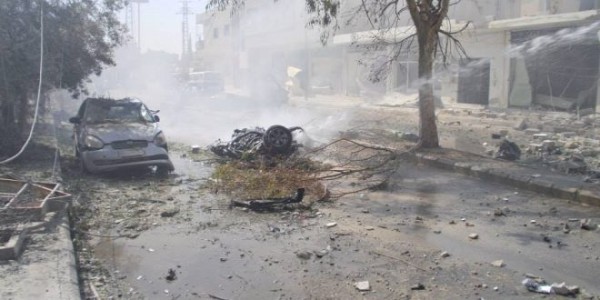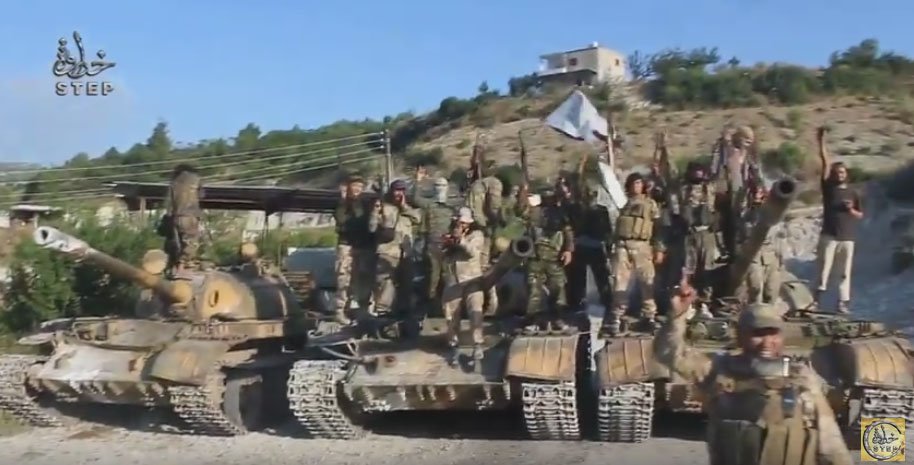PHOTO: Rebels with captured tanks in Kinsabba in Latakia Province on Friday
LATEST
- 45 Regime Airstrikes on Town Near Damascus After Killing of Pilot
- New Syrian Army Commander on Failed Offensive v. ISIS
SATURDAY FEATURE
Refugees Near Jordan’s Border Struggle to Survive — and Now There’s No Water
UPDATE 0900 GMT: Rebels have taken more territory in northern Latakia Province, following their capture of the town of Kinsabba.
The Yarmouk offensive took the mountaintop of Jabal Qal’at and several small villages near the town of Saraf and a crossing into Hatay Province in southeastern Turkey.
Rebels taking a regime camp:
Free Syrian Army unit on the move:
ORIGINAL ENTRY: Rebels have retaken an important town in Latakia Province in western Syria, pushing back regime-Russian gains since last autumn.
The rebel bloc Jaish al-Fatah moved into Kinsabba on Friday morning, capturing at least eight tanks, four BMP armored vehicles, 25 Kornet anti-tank guided missiles and “many other” ATGMs, mortars, rockets, and other weapons.
Pro-regime accounts said the Syrian military withdrew “to avoid suffering a large casualty figure in the face of a barrage of artillery shells, mortar shells, and missiles”.
However, pro-regime reporter Eyad al-Hussein, embedded with the Syrian army, offered a frank assessment that points to wider problems for the regime forces.
Al-Hussein said that, while defenses at one of two lines had “honest and heroic officers” with troops, those in Kinsabba were marked by “few and bad” patterns of fire. He said there were few or no technical vehicles, ambulances, and other resources, either because they were left behind in coastal cities or because the army was no longer obtaining them: “The officers collected money from their own pockets to buy a used tire.”
Al-Hussein concluded, “The situation in Kinsabba and what’s next is very bad and getting worse moment by moment.”
Jaish al-Fatah launched its Yarmouk offensive on Monday, gaining territory in the mountains of Jabal al-Akrad and Jabal Turkmen near the Turkish border. The Syrian military initially disputed that the rebels were advancing, but the attackers took villages on Thursday to close on Kinsabba.
Supported by Russian airstrikes, the Syrian military had occupied Kinsabba in mid-February. Control of the town opened up the possibility of a further advance into opposition-held Idlib Province.
Rebels inside Kinsabba:
45 Regime Airstrikes on Town Near Damascus After Killing of Pilot
The Syrian Air Force has carried out 45 airstrikes and killed dozens of people in retaliation for the downing of a warplane and execution of the pilot, according to pro-rebel activists.
The Revolutionary Forces of Syria Media Office said the attacks were on Jairoud in the eastern Qalamoun region in Damascus Province. It claimed the medical center was struck, killing the manager and a paramedic.

An Su-22 jet fighter crashing on Friday, following the downing of two other warplanes by rebel missiles in the past week. The pilot, a major in the Syrian Air Force, was executed by the jihadists of Jabhat al-Nusra.
The rebel faction Jaish al-Islam repeated on Saturday that Nusra broke an agreement to hand over the pilot alive, and reiterated its demand for the handover of the body.
See Syria Feature: Regime Warplane Downed by Rebels, Pilot Killed by Jabhat al-Nusra
Residents of Jairoud demand that Jabhat al-Nusra leave the town:
New Syrian Army Commander on Failed Offensive v. ISIS
A commander of the US-supported New Syrian Army has spoken about this week’s failed offensive against the Islamic State in eastern Syria.
Khazaal al-Sarhan told The Daily Beast of a series of events that led to Tuesday’s defeat near Abukamal, close to the Iraqi border. The NSA initially took positions near the town, which is vital to ISIS supply lines from Iraq, but were then overrun in an Islamic State counter-attack which took vehicles, weapons, and satellite communications equipment.
See Syria Daily, June 29: Islamic State Repels Attack by US-Supported Force
Sarhan said that “sleeper cells” were hindered in Abukamal by an ISIS curfew and by leaks that gave the Islamic State intelligence about the operations, including tip-offs by tribesmen on the Iraqi side of the border. As a result, ISIS lured the NSA into its advance and then carried out ambushes and sniper attacks.
The biggest cause of the defeat, claimed the commander, was the inability of other factions from eastern Syria to join “under one umbrella”.
However, he maintained that the Islamic State had exaggerated the scale of the defeat when it said 40 NSA troops were killed and 15 captured: “We sustained five casualties and none of our men has been captured.”
Sarhan closed with a swipe at the US, saying that it has not provided enough support: “The Pentagon has the will and ability to collect more manpower but it is taking them a very long time to bring this into effect and this negatively impacts those on the ground in Syria.”
The NSA was created last year to fight the Islamic State in eastern Syria and given US support through arms, supplies, and special forces. After capturing the border town of al-Tanf from ISIS in March, the army suffered a setback in early May when the Islamic State carried out suicide bombings that killed many fighters.

